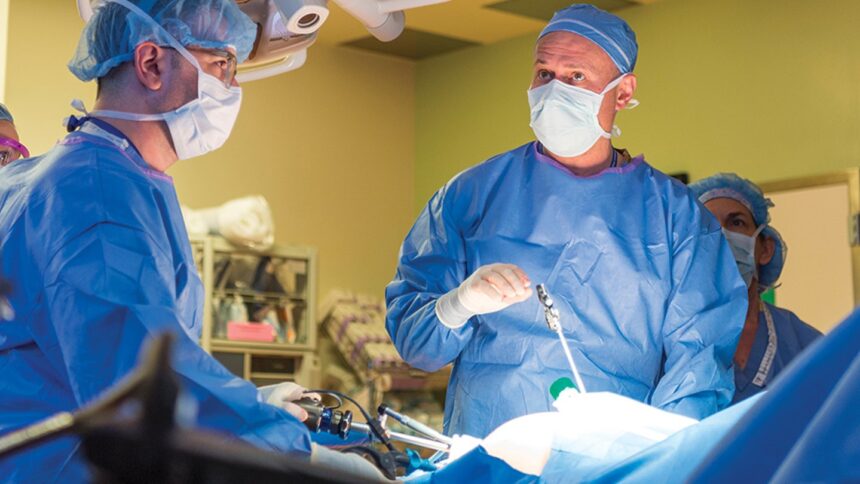Bariatric surgery in Abu Dhabi is becoming an increasingly popular and effective solution for individuals struggling with obesity and its associated health risks. In Abu Dhabi, the demand for bariatric procedures has grown significantly, offering patients a chance to reclaim their health and well-being. This article explores the different types of bariatric surgeries available, the benefits they offer, and how they help individuals achieve long-term weight loss success.
What is Bariatric Surgery?
Bariatric surgery refers to a group of medical procedures aimed at helping individuals with obesity lose weight. It typically involves modifying the digestive system to limit the amount of food one can eat or how much can be absorbed. These surgeries are usually recommended when traditional weight loss methods such as diet and exercise have not been successful, and when obesity is causing serious health problems such as diabetes, high blood pressure, and sleep apnea.
In Abu Dhabi, bariatric surgery is carried out by highly skilled surgeons, and patients benefit from world-class medical facilities equipped with the latest technologies and treatment options.

Types of Bariatric Surgery in Abu Dhabi
There are several types of bariatric surgeries performed in Abu Dhabi, each with its own set of benefits, risks, and suitability for different patients. The choice of surgery depends on the patient’s overall health, weight loss goals, and personal preferences. The most common types of bariatric surgery include:
1. Gastric Bypass Surgery (Roux-en-Y Gastric Bypass)
Gastric bypass surgery is one of the most common and effective bariatric surgeries performed in Abu Dhabi. This procedure involves creating a small pouch at the top of the stomach and connecting it directly to the small intestine, bypassing a portion of the stomach and the upper part of the small intestine. This reduces the amount of food you can eat and the number of calories your body absorbs.
Benefits of Gastric Bypass Surgery:
- Significant long-term weight loss
- Improvement in obesity-related health conditions such as diabetes, hypertension, and sleep apnea
- Reduced risk of heart disease and stroke
2. Sleeve Gastrectomy (Gastric Sleeve)
Sleeve gastrectomy, also known as gastric sleeve surgery, involves the removal of a large portion of the stomach, leaving a tube-like structure that resembles a sleeve. This reduces the stomach’s capacity, thereby limiting the amount of food a person can consume. The procedure also alters the hormones responsible for hunger, reducing appetite and aiding in weight loss.
Benefits of Sleeve Gastrectomy:
- Significant weight loss with fewer complications than gastric bypass
- Shorter recovery time
- Fewer changes to the digestive system
- Reduced risk of heart disease and type 2 diabetes
3. Gastric Banding (Lap-Band Surgery)
Gastric banding involves placing an adjustable band around the upper part of the stomach to create a small pouch. This reduces the amount of food the stomach can hold and slows down the digestion process, leading to a feeling of fullness sooner. The band can be adjusted over time to meet the patient’s needs.
Benefits of Gastric Banding:
- Less invasive with shorter recovery time
- Adjustable, which allows for ongoing modifications as necessary
- Reversible, unlike other bariatric surgeries
4. Biliopancreatic Diversion with Duodenal Switch (BPD/DS)
This complex surgery combines elements of both sleeve gastrectomy and gastric bypass. It involves removing a portion of the stomach and rerouting a significant portion of the small intestine to reduce calorie absorption. It is typically recommended for individuals with extreme obesity and those who have not responded well to other weight loss methods.
Benefits of BPD/DS:
- Significant weight loss and long-term success
- Greater improvement in obesity-related conditions such as diabetes
- High success rate in patients with extreme obesity
Benefits of Bariatric Surgery in Abu Dhabi
Bariatric surgery is not just about losing weight — it also offers numerous health benefits that can significantly improve a patient’s quality of life. Here are some of the key benefits:
1. Improvement in Obesity-Related Health Conditions
Obesity is linked to a variety of chronic health conditions such as:
- Type 2 diabetes: Bariatric surgery has been shown to lead to remission in many patients with diabetes.
- High blood pressure: A reduction in weight helps lower blood pressure, which decreases the risk of heart disease.
- Sleep apnea: Weight loss can significantly reduce the severity of sleep apnea or even eliminate the need for CPAP therapy.
2. Enhanced Quality of Life
As patients lose weight and improve their health, they often experience a boost in their self-esteem, mental health, and overall quality of life. Many report increased mobility, better energy levels, and improved mental clarity.
3. Long-Term Weight Loss
Bariatric surgery offers a long-term solution to weight loss, especially when combined with lifestyle changes such as a healthy diet and regular exercise. Studies have shown that patients can lose significant amounts of weight and maintain it over the long term, leading to a better life.
4. Reduced Risk of Heart Disease
Being overweight increases the risk of heart disease, strokes, and other cardiovascular issues. Weight loss through bariatric surgery helps reduce cholesterol levels, blood pressure, and other heart disease risk factors.
How to Qualify for Bariatric Surgery in Abu Dhabi
To qualify for bariatric surgery, patients generally need to meet specific criteria. These include:
- BMI of 40 or higher, or a BMI of 35 or higher with obesity-related health conditions such as diabetes, hypertension, or sleep apnea.
- Previous attempts at weight loss through diet and exercise have not been successful.
- The patient is in generally good health and can tolerate surgery.
- The patient has realistic expectations and is willing to commit to long-term lifestyle changes, including diet and exercise.
Pre-Surgery Evaluation and Consultation
Before undergoing bariatric surgery in Abu Dhabi, patients will undergo a comprehensive evaluation to determine if they are suitable candidates for surgery. This may include:
- A full physical examination
- Blood tests
- Psychological assessment
- Nutritional counseling
- Discussions about surgery options, risks, and expectations
Aftercare and Lifestyle Changes Post-Surgery
The success of bariatric surgery is heavily reliant on the patient’s commitment to making lifestyle changes after the procedure. Following surgery, patients will need to adopt healthier eating habits, engage in regular physical activity, and attend follow-up appointments for monitoring their progress.
Some key post-surgery tips include:
- Adopting a healthy, balanced diet that includes small, frequent meals.
- Engaging in regular physical activity to enhance weight loss and improve health.
- Attending follow-up appointments with the healthcare provider to monitor weight loss, nutritional intake, and general well-being.
Conclusion
Bariatric surgery offers an effective solution for individuals in Abu Dhabi who are struggling with obesity and its associated health risks. With a range of procedures to choose from, patients can find a weight loss solution tailored to their unique needs. The health benefits of bariatric surgery, including improved weight loss, better management of chronic conditions, and an enhanced quality of life, make it a life-changing option for many. If you are considering bariatric surgery in Abu Dhabi, it’s important to consult with a qualified healthcare provider to discuss your options, undergo proper evaluation, and commit to a lifelong journey of health and well-being.



